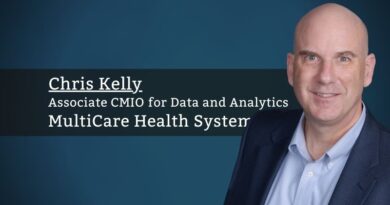
Talent shortage and burnout are common issues in the healthcare industry. Healthcare facilities and hospitals struggle to optimize their medical staff while keeping operating and administrative costs reasonable. Moreover, the mental load on clinicians to make accurate clinical decisions based ...

By Sheldon A Pink, President & CEO, Krystal Rock Innovation Group Automation is taking the healthcare industry by storm. Every organization is exploring opportunities to invest in Robotic Process Automation (RPA), Machine Learning (ML), or Artificial Intelligence (AI). Even though ...

By Ahmad Kakar, Healthcare IT Leader, California A hidden revolution is happening in modern hospitals’ busy hallways. Beyond stethoscopes and patient records, digital transformation has been and is changing healthcare. You might ask, ‘What's leading this charge?’ It's the Enterprise ...

By Bashir Agboola, MBA, MSc., VP/CTO, Hospital for Special Surgery (HSS) Major technological advancements and crises often herald momentous changes in society that create rapid and lasting impacts. For example, the recent COVID-19 pandemic’s acceleration of digital transformation across industries ...

By Jon Darnell, Director, Medical Imaging, Texas Health Harris Methodist Hospital Alliance In the last several years, my healthcare system has implemented several pieces of AI software in the radiology departments, both across the system and at individual hospitals. We ...

By Chris Kelly, Associate CMIO for Data and Analytics, MultiCare Health System No one in healthcare will forget March 2020, staring down the worst pandemic in living memory. Society shut down. People started dying at unheard-of rates in Italy, and ...

By Dustin Hufford, SVP & CIO, Cooper University Health Care Healthcare’s primary problem is not the lack of data, but the lack of fidelity and usability of the available data. The challenge is collating, interpreting, and distilling data to a ...

By Joseph Bynum, Director of Imaging Services, Northwell Health – Peconic Bay Medical Center What are the prevailing conditions of your work environment? As a director of imaging services in Long Island for NY state’s largest health system, I serve ...

By George Renchao Wu, Senior Diagnostic Radiology Resident, and Arash Kardan, Chief of Nuclear Medicine and Molecular Imaging, Baylor College of Medicine George Renchao Wu, Senior Diagnostic Radiology Resident The future of healthcare is here. Will physicians be a part ...

By Andrea Reed, VP of Pharmacy, Novant Health Artificial intelligence (AI) is the development of computer systems to perform tasks that typically require human intelligence, using various inputs of data and generally involving deep learning, decision-making, visual perception, and natural ...
Artificial Intelligence (AI) is a recent advancement in technology that uses intelligent machine learning (ML) algorithms and natural language processing (NLP) to make a machine think and act like a human, predict and respond to actions based on available data. Large amounts of data are getting generated every day in almost all industries. AI helps realize the value of scattered, unused, unattended data by comparing the data patterns (similarities and differences) and turning them into meaningful, valuable information. Basically, it supports humans by interpreting the data. Though AI finds its application in all the industries these days, its role in healthcare is crucial since it helps providers deliver the best care a patient needs. AI helps healthcare providers and payers by automating tedious manual processes, which requires minimum to no human intervention. From appointment scheduling using chatbots or Conversational AI, clinical documentation, and administrative workflow to disease diagnosis, treatment and prevention processes, image recognition, drug research, its applications produce error-free reports with minimal investment. AI-based or AI-assisted applications are widely being used in the healthcare industry.









